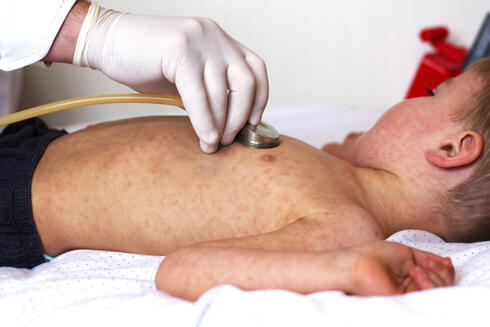Doctors at Hadassah Medical Center in Jerusalem on Thursday confirmed the death of an 18-month-old boy who contracted measles last month and was not vaccinated, marking the third toddler to die of the disease in less than a week. His death raised the total toll from the outbreak to five.
Hadassah said the girl had been admitted in critical condition with severe breathing difficulties and connected to ECMO immediately. “The team fought for her life for weeks, but secondary infections from measles led to the collapse of her body’s systems,” the hospital said in a statement.
The Health Ministry announced earlier this week that the 16-month-old boy who died was also unvaccinated. In recent weeks, two other children died: a 2-year-old boy who was on ECMO for several weeks, and an 18-month-old boy who succumbed within days of infection. Neither had been immunized.
Currently, 21 measles patients are hospitalized in Israel, most of them children under age 6 who were not vaccinated. Six are in intensive care.
United Hatzalah paramedics said they performed resuscitation on the most recent victim, who lost consciousness at home in Jerusalem’s Mea Shearim neighborhood after contracting measles a month earlier. “We carried out CPR with a physician, and he was evacuated to Hadassah in critical condition,” first responder Avremi Rozovski said.
The Health Ministry has now identified Jerusalem, Beit Shemesh, Bnei Brak, Harish, Modi’in Illit, Nof Hagalil, Kiryat Gat and Ashdod as outbreak centers. Vaccinations are available at maternal and child health centers and HMOs in those areas without appointments.
A highly contagious disease
Measles is a highly contagious viral illness characterized by fever, fatigue, runny nose and rash. Complications can include pneumonia, heart and kidney damage and vision loss, as well as neurological issues. These risks can be avoided with a safe and effective vaccine that has been proven in extensive research worldwide, including in Israel.
The Health Ministry recommends children be vaccinated at age 1 and again at age 6. In outbreak areas, the second dose is given earlier, at 18 months. Babies aged 6 to 11 months living in or traveling to outbreak zones are also advised to receive an early dose, which provides 70–85% protection but does not replace the two standard doses.
Due to the partial protection before age 1, health officials advise families of young infants and unvaccinated children of any age to avoid crowded spaces, public events, synagogues and mass gatherings. Visits to clinics or emergency rooms should be coordinated in advance to protect others.

